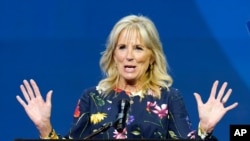First lady Jill Biden is using her powerful platform and her background as an educator to fight for a cause close to her heart: literacy.
In doing so, she brings home a cause that the U.S. government has spent years spreading around the globe, with a multitude of programs that promote the value — and also the joy — of reading in some of the world’s poorest countries.
Biden, who is the first, first lady to hold a full-time job outside the White House, drew a straight line from her professional pursuits to the well-being of the American people. She spoke before some 200 educators who gathered Wednesday in Washington for the National Summit on Adult Literacy, an event convened by the foundation of former first lady Barbara Bush.
“Mrs. Bush understood the incredible power of this platform,” Biden said. “She chose literacy because she wanted to help the most people possible. She believed that everything she was worried about — from homelessness to hunger and crime — could be tied back to literacy and education. And you know what? She was right.”
Literacy-diplomacy
Outside of Washington, this is a message that forms a key part of American engagement. The U.S. Agency for International Development (USAID) works on literacy and education programs that reach nearly 70 million children in more than 50 countries — among them some of the world’s poorest.
From coastal Africa to the Caribbean, over the steppes of Central Asia and into the wild and borderless domain that is the internet, USAID conducts myriad programs aimed at improving literacy.
“In the over 40 Early Grade Reading programs that USAID supports worldwide, USAID missions support improvements in reading through methods that reflect current international scientific educational achievement studies conducted in many languages and cultures,” the agency said in a press release, adding that many of its programs teach children to read in a local language.
In rural Mozambique, the “Vamos Ler!” bilingual early-grade reading program works on the reading and writing skills of more than 800,000 children in rural Nampula and Zambezia provinces. In the landlocked central Asian nation of Tajikistan, the “Read with Me” project partnered with that nation’s Ministry of Education and Science to host a popular radio show for children called “Let’s Read Together.” And in the Dominican Republic, a USAID program worked this year to improve the reading skills of 200,000 students in more than 370 schools.
USAID also manages the free online Global Digital Library, a repository of more than 6,000 books in 83 languages.
World Bank statistics show a marked difference in literacy between high- and middle-high-income nations, which have extremely high rates of adult literacy; and low-income nations, where literacy levels hover on average around 61%. Studies show that low literacy is a serious impediment to building wealth — a fact that Biden brought home.
“Jobs, helping your child through school, or the ability to support your family all require the ability to read,” she said.
More than half of American adults read below a sixth-grade level, according to the Barbara Bush Foundation, and nearly one in five American adults read below a third-grade level, which makes it difficult for them to perform necessary and valuable tasks like filling out job applications, taking driving tests, digesting news articles or casting ballots.
But Biden said literacy is a transferable skill that can have a big impact. She urged Americans to do their own small part.
“When we see people in the community who are struggling, to get a job interview, to put food on the table, to learn — maybe we offer to babysit. We all donate food to food banks. We volunteer to help someone learn to read. We can change the world in big ways and small ones,” she said.




